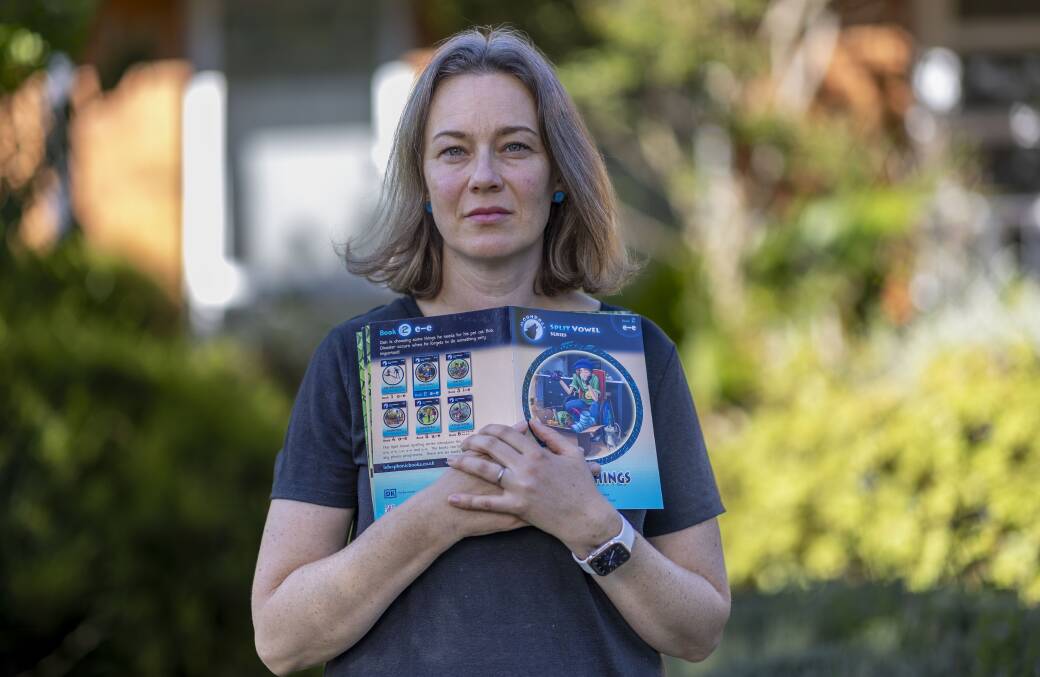Stephanie Sleen got a message from her son's teacher midway through year 1 that made her stomach drop.
The teacher said she was proud of the work he had done, writing a story about a giraffe and lion. The sentence he wrote was: "EPBPbxgbnop THo TBHoT Oo."
It took several weeks to meet with the teacher to be told that there was a long wait to see the school psychologist and nothing would be done differently unless the child had a diagnosis of autism. She was told her child could read but didn't try.
She found a private tutor at a cost of $600-$1000 per term for 30 minutes a week. To cut costs, Ms Sleen opted to do a Sounds-Write linguistic phonics course so she could teach her own child to sound out words instead of looking at the picture to guess words.
Now in year three, the consequences of early neglect are flowing onto other subjects, including maths, and are taking a toll on his confidence.
"The biggest thing for me is just equality. We have some extra money that we can throw at this problem, but a lot of families wouldn't," Ms Sleen said.
"We were also like told by the school, 'No, he's fine. He's at standard. He's at benchmark'. And he wasn't and it was really clear to us that he wasn't.
"And I thought if we were an English as a second language family, we would take them at their word."

Ms Sleen told her story in a submission to the inquiry into literacy and numeracy in ACT public schools.
The independent inquiry was launched in October after the gap between disadvantaged and advantaged students grew last year.
Some of the submissions have been made public on the inquiry's website as the panel works on it's final report, due to the Education Minister's office at the end of April.
The cost of catching up
The ACT Council of Parents and Citizens Associations said in their submission that public schools could take a more consistent approach that provides more structure and guidance for teachers.
The council heard that parents wanted better support for children with learning difficulties, such as dyslexia, dysgraphia and ADHD.
They also wanted all students to be challenged to reach their potential, rather than being taught to a minimum standard.
The peak body for public school parents said reporting on student achievement in literacy and numeracy should be improved so that learning difficulties are picked up before gaps become too large.
"Currently most parents receive A to E reporting without comments, as a measure to reduce teacher workloads," the council's submission said.
"However, this does not give parents and carers a clear indication of student progress and achievement in the crucial areas of literacy and numeracy."
One parent, who chose to remain anonymous, said it took five years to discover their child's school had failed to identify multiple learning and physical disabilities.
They spent $21,000 on private assessments and therapy while in the public school system. The family now spends $23,000 per year on education after switching to a non-government school.
"By the time he completes year 12, we will have spent over $200,000 on his schooling, despite being entitled to a free and appropriate public education," the anonymous parent wrote.
"We are reluctant participants in the trend of moving children out of public schools, which exacerbates socioeconomic disparities in educational opportunities."
The parent said they were "disheartened to see public comments from the teachers' union implying that it is just disadvantaged kids and children with disabilities who are struggling and that this is to be expected".
Another anonymous parent submission said they had bought their own decodable reading books to teach their child to read in kindergarten and then got a private tutor.
"Schools need to be implementing commercially available synthetic phonics programs," the parent said.
"They also need to teach maths in ways aligned with the science of learning. Teachers have to be trained to do so. Have a look at what ACT Catholic schools are doing. It's working."
Less talk, more action
Another parent named Beck said she was disappointed to see not much had changed in the school system since she attended school.
Her dyslexia went undiagnosed until university and now her own son, who has dyslexia and inattentive ADHD, is also falling behind in class. He has a private tutor but school remains a struggle.
"A school environment that provided education for neurodiverse children would be ideal," Beck said.
"Unfortunately, decades on from my schooling experience, this is still not the case."
Ms Sleen sincerely hopes the ACT education system will change for the sake of her younger child.
However, she said the idea of an inquiry was "silly" considering the Grattan Institute had recently released a report with recommendations of how Australian governments should improve reading instruction.
"What is the review going to find out that's going to be different?
"It's a bunch of money spent poorly. I would say they just need to actually make the change that other jurisdictions in Australia have made and just go ahead with that."







